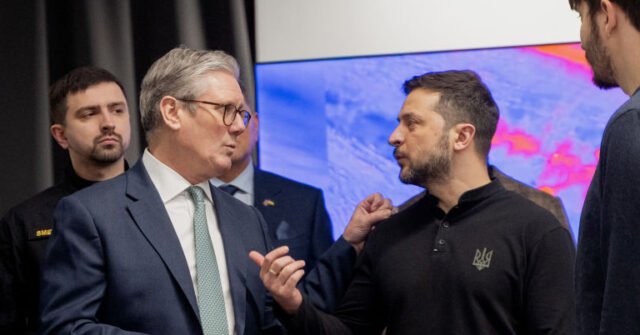British Prime Minister immediately offered Volodymyr Zelensky affirmation over his democratic status after President Trump blasted Ukraine for cancelling its elections and enforcing martial law on its citizens.
Sir Keir Starmer spoke to Ukrainian President Zelensky overnight, with his Downing Street office revealing the Prime Minister had told the Ukrainian he is not a dictator and that it had been “perfectly reasonable” to suspend democracy because of the Russian invasion.
The comments follow Donald Trump airing his views on the state of Ukrainian democracy, saying if Ukraine’s leadership wants a seat at the table, the Ukrainian people should be consulted on who they will send to sit at the table. Later remarks were more strident — perhaps in response to Zelensky’s angry answer to the initial comments, and accusing Trump of repeating Russian “disinformation — and called Zelensky a dictator.
President Trump had said: “A Dictator without Elections, Zelenskyy better move fast or he is not going to have a Country left… I love Ukraine, but Zelenskyy has done a terrible job, his Country is shattered, and MILLIONS have unnecessarily died”.
These remarks likely come as part of a strategy of pre-positioning by the United States ahead of the coming U.S.-Russia peace talks, and the United Kingdom government was fast to counter-signal against them. Downing Street said of Starmer’s call with Zelensky: “The prime minister spoke to President Zelenskyy this evening and stressed the need for everyone to work together. The prime minister expressed his support for President Zelenskyy as Ukraine’s democratically elected leader”.
Starmer also told Zelensky that “it was perfectly reasonable to suspend elections during war time as the UK did during the second world war.”
It is certainly true the United Kingdom did suspend its elections during the Second World War. The General election had meant to be held in 1940 — the year of the Battle of Britain — but they were delayed until July 1945. This was after the end of the war in Europe, but while the United Kingdom was still heavily involved in the war in the Pacific against Imperial Japan, so the election did take place during wartime, delayed or not.
In that election, fêted wartime leader Winston Churchill was kicked out of office in a landslide for the political left by apparently unsentimental Britons, rushing for political change a decade after the last national vote.
Ukraine has insisted that, actually, Zelensky’s opinion polling is very high, but how accurate polling is in wartime in a system with no opposition parties or media is hard to judge. While he has frequently been praised as a Churchill-like figure in the European press in the course of the Russian invasion for Ukraine’s steadfast defence, given the unceremonious removal of Churchill by the British as the war ended in 1945 he might hope the comparison doesn’t ring so true.
As reported yesterday of the situation with Ukraine’s democracy:
Ukraine’s state of war makes understanding the full truth of this matter difficult, if not impossible. Martial law banned all opposition parties, and some opposition politicians, branded “traitors” and “collaborators” by the government, have even been assassinated in the course of the conflict. Furthermore, millions of Ukrainians are abroad as refugees and may not be easy to reach for pollsters to survey.
For all these reasons, actually holding fresh elections quickly may be difficult, but not impossible. Ukrainians abroad could vote through its global network of embassies, but persuading Zelensky to again allow the existence of a political opposition to campaign for that election — particularly given that some of the banned Ukrainian parties that existed in the pre-war parliament in Kyiv are avowedly pro-Russian — may be more of a challenge.
Ukraine last held national elections in 2019, and they were due to be held again in 2024 for both the parliament and the presidency. The present position of the Zelensky administration is that there will be no new elections until after the war is over, as the conflict makes holding a fair election impossible.
Other European leaders reacted with fury at Trump’s remarks, including Sweden’s Prime Minister and the German Foreign Minister Annalena Baerbock of its hard-left Green party, who said the word characterised the experience of people living in Russia and Belarus rather than Ukraine.
Read More: Starmer Rebuffs Trump, Reassures Zelensky It’s OK to Cancel Elections


